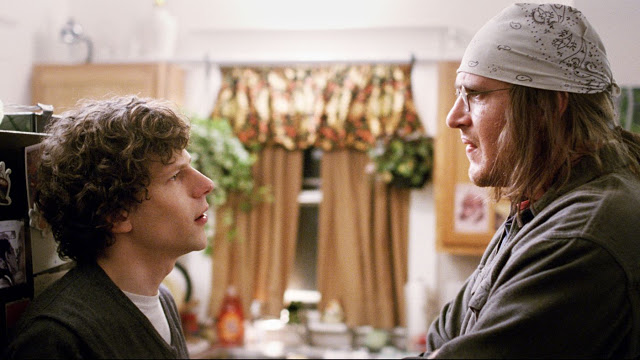The End of the Tour: Talking About Writing, and Other Demons
Writing in the New York Times in 1996 about Infinite Jest, the magnum opus from David Foster Wallace, the critic Jay McInerney wrote, “While there are many uninteresting pages in this novel, there are not many uninteresting sentences.” I feel similarly about The End of the Tour, James Ponsoldt’s compassionate, provocative, and occasionally dull recreation of the five-day period shortly following the release of Infinite Jest, in which Rolling Stone‘s David Lipsky trailed Wallace on his promotional rounds. It is not an especially kinetic movie, and if it is in no hurry to go anywhere, its luxuriant patience occasionally creeps into stasis. But it is also a sharply scripted and profoundly affecting character study, tenderly depicting two writers who are deeply committed both to their specific jobs and to the grander notion of composing meaningful words. Wallace and Lipsky both believed that their prose, as painful as it was to conceive, might actually mean something. The End of the Tour nobly honors their commitment, even if certain stretches of its narrative feel meaningless.
The movie opens in 2008, with a dumbfounded Lipsky (Jesse Eisenberg, even better than usual) learning of Wallace’s suicide, a tragic event whose dark shadow looms over The End of the Tour. It then flashes back 12 years, revealing Lipsky as a hungry and energetic young writer who keeps hearing about this rapturously received tome called Infinite Jest. Animated by both jealousy and disbelief, he scoffs at the reviews claiming that this mammoth novel heralds the arrival of the next Pynchon. Then he reads it. Not long after, he’s pleading with his editor at Rolling Stone to interview Wallace for a celebrity profile, and then he’s jetting off to snowy Illinois, hoping to reconcile this generation-defining book with the mere mortal who wrote it. Read More


 “I’d like to think that there’s more to a person than just one thing,” Aimee Finicky says early in The Spectacular Now. I’d like to think she’s right. There is certainly more than just one thing to The Spectacular Now, James Ponsoldt’s swooning, touching third feature. Like Aimee, it refuses to be pigeonholed. This is partly because, in strict genre terms, it has no strict genre; instead, it melds elements of various tropes, making it not only a winning coming-of-age story, but also an earnest teen romance, a wistful family drama, and even a sobering study of addiction. But far more important than the multiplicity of the film’s form is the raw power of its content. The Spectacular Now is not one thing, because it is many things: spry and funny, sad and heartfelt, honest and scary, rueful and rewarding. It’s a movie that would make Aimee Finicky proud.
“I’d like to think that there’s more to a person than just one thing,” Aimee Finicky says early in The Spectacular Now. I’d like to think she’s right. There is certainly more than just one thing to The Spectacular Now, James Ponsoldt’s swooning, touching third feature. Like Aimee, it refuses to be pigeonholed. This is partly because, in strict genre terms, it has no strict genre; instead, it melds elements of various tropes, making it not only a winning coming-of-age story, but also an earnest teen romance, a wistful family drama, and even a sobering study of addiction. But far more important than the multiplicity of the film’s form is the raw power of its content. The Spectacular Now is not one thing, because it is many things: spry and funny, sad and heartfelt, honest and scary, rueful and rewarding. It’s a movie that would make Aimee Finicky proud.